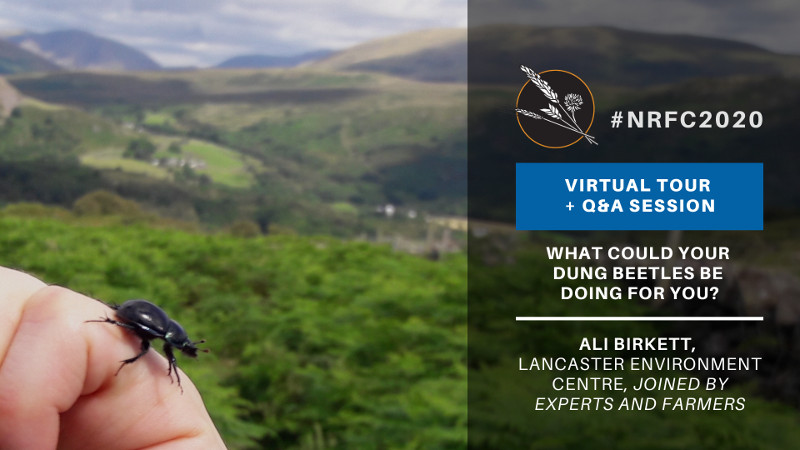So, what could your dung beetles be doing for farmers and land managers? Lots, according to the expert insight of farmers Sally-Ann Spence and Bruce Thompson. If the dung beetles are looked after in return, that is.
Opening the session, host Ali Birkett (Lancaster Environment Centre, Lancaster University) gave an academic introduction to the ecology of dung beetles in Britain. The main content of the session took the form of pre-recorded video farm tours:
• Sally-Ann Spence (Berrycroft Hub) demonstrated how to find dung beetles out on the farm, including describing the diversity of species and how by breaking dung they reduce livestock parasite load and improve soil health
• Bruce Thompson (Nuffield Scholar) showed actions he is taking on his dairy farm to support dung beetle population, including actions taken to reduce his use of veterinary insecticide treatments
• Tonia Armer (Cumbrian beef and sheep farmer) shared her first experience of looking for dung beetles on her farm, with comment from the other speakers on what she discovered
Themes arising:
The size of the audience, the number of questions asked of the speakers, and the number of requests for access to the videos as a learning resource shows the growing interest in the subject. Themes arising from the questions suggested an interest in:
1. developing the skills required to assess the size and health of dung beetle populations on farms / in the landscape
2. learning from each other’s experiences of the positive benefits dung beetles can have on livestock and soil health
3. sharing details of each other’s successful and unsuccessful approaches to change farming practices to support dung beetle activity
‘As the novice in the group, I was quite staggered by the possibilities of improving my soil health to improve stock health as well as improving the land’s ability to retain water and resist flooding and bury carbon. I’d heard of holistic farming before, but never really ‘got’ it. Dung beetles are such a good way of making you think about the whole system and what your actions do to it.’ Tonia Armer
Dung beetles were also discussed in detail by Vet Sustain in their NRFC2020 session, showing the crucial support the vet community is developing for this subject.
Thoughts for the future:
• Given the interest, it would be great to create a knowledge-sharing network of farmers, farm advisors, conservation groups, researchers and veterinarians interested in dung beetles.
• Bruce Thompson and Sally-Ann Spence are developing the website ‘Dung beetles for farmers’ www.dungbeetlesforfarmers.co.uk that will provide a great resource (and could be used as a hub for a knowledge-sharing network)
• There was a call from the audience for a training course on the subject and exploring whether NRFC and partners fund and support the development of this
You can watch the recording of the session here.

